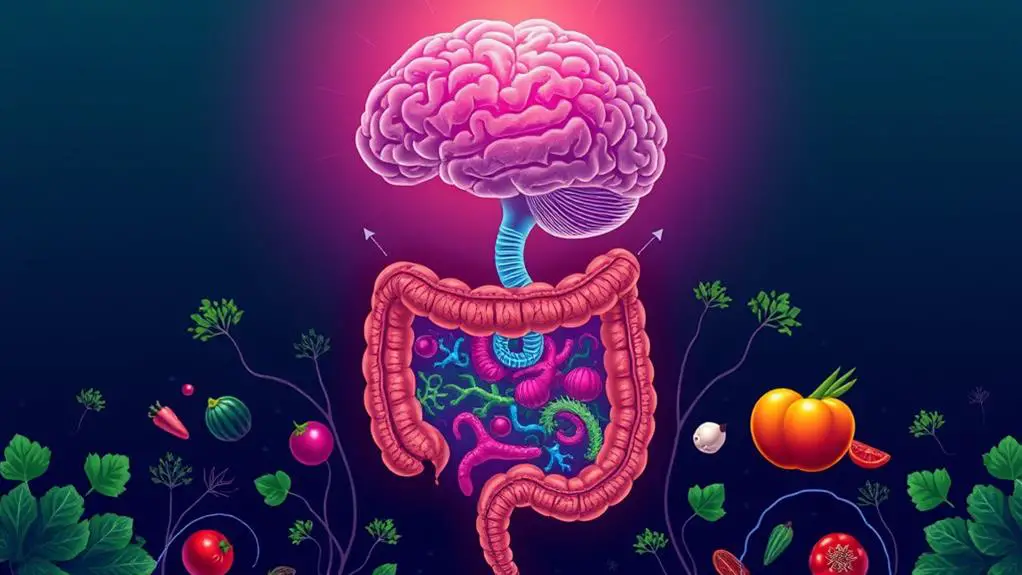
Switching to a keto diet, which cuts carbs and boosts fats, can do wonders for your mood and anxiety. Imagine feeling calm and relaxed because your brain's GABA levels are higher, thanks to this diet. Plus, it keeps your blood sugar steady, giving you a more stable, happy mood. It lowers inflammation, which really helps reduce anxious feelings. And guess what? Your gut health improves too, which is awesome for your overall mental health. By balancing key neurotransmitters and improving gut bacteria, keto could be the secret weapon against anxiety and mood swings. Want to know the science behind it?
Key Takeaways
- Ketogenic diet increases GABA levels, promoting calmness and reducing anxiety.
- Stabilizing blood sugar levels on keto diet improves mood and insulin sensitivity.
- Ketogenic diet reduces inflammation, a contributor to mood disorders.
- Improved gut microbiome diversity on keto positively impacts mental health.
- Over 70% of study participants report improved mental health on ketogenic diet.
Understanding the Keto Diet
The ketogenic diet, with its origins in the 1920s as a therapeutic intervention for epilepsy, requires a substantial reduction in carbohydrate intake, typically to around 25-50 grams per day. This big cut in carbs makes your body switch to burning fat for energy instead. Hello, ketosis! It's not just about eating less bread; it's about changing how your body fuels itself.
The keto basics are straightforward: high fats, moderate proteins, and very low carbs. But did you know there are diet variations? Some folks do "standard keto," while others might try "cyclical keto" or "targeted keto," depending on their goals—like sports performance or muscle building.
The ketogenic diet took off in the 1970s with Dr. Robert Atkins' program, and by 2018, it was the most googled diet trend. Crazy, right? People love it because of potential perks like better brain function and reduced inflammation.
Plus, it might help your gut, which is super important for mental health!
But watch out! The keto diet isn't for everyone and can lead to nutritional deficiencies or the dreaded "keto flu." Always good to have medical supervision when diving into this high-fat world.
Keto and Mood Enhancement
Emerging evidence suggests that the ketogenic diet may significantly enhance mood and alleviate symptoms of anxiety and depression. Over 70% of participants in various studies have reported feeling better mentally, even without actively monitoring their ketone levels. This is likely due to several ketosis benefits that contribute to mood stability.
One key factor is the increase in GABA levels, a neurotransmitter that promotes calmness and relaxation. Higher GABA can help regulate mood, making you feel more balanced and less stressed.
Additionally, the ketogenic diet has been shown to improve mitochondrial function and reduce oxidative stress. Both of these are essential for keeping your mood stable and your mind clear.
But that's not all. The diet also helps stabilize blood sugar levels, which can improve mood and lower the risk of depression by increasing insulin sensitivity.
Some studies even suggest that people with serious mood disorders, like bipolar disorder and schizoaffective disorder, may benefit from this dietary approach. Although the effects can vary, the potential for personalized dietary recommendations offers hope for those struggling with mood issues.
Reducing Anxiety With Keto
Reducing anxiety with the keto diet involves boosting the brain's balance of neurotransmitters like GABA, which helps calm the mind and body.
Additionally, by lowering inflammation, which is linked to mood disorders, the diet may offer further relief from anxiety symptoms.
This approach not only stabilizes blood sugar levels but also supports overall mental well-being, making it a promising option for those seeking to manage anxiety.
Enhancing Neurotransmitter Balance
A well-balanced neurotransmitter system plays a critical role in mental health, and the ketogenic diet offers promising avenues for enhancing this balance.
Neurotransmitter synthesis relies heavily on dietary amino acids, and the keto diet supports this by emphasizing protein-rich foods.
Let's break down how keto can help balance neurotransmitters and reduce anxiety:
- Increased GABA Levels: The keto diet may boost GABA, a calming neurotransmitter, which can help reduce feelings of anxiety and promote relaxation.
- Improved Energy Metabolism: By enhancing mitochondrial function, the keto diet improves brain cell energy metabolism, positively affecting mood and stress response.
- Stable Blood Sugar Levels: The keto diet helps stabilize blood sugar, reducing insulin fluctuations that can cause mood swings and anxiety.
- Boosted Neurotransmitter Production: Some studies suggest that keto can increase the production of serotonin and dopamine, key neurotransmitters for regulating mood.
Mitigating Inflammatory Responses
In an article titled "Keto and Mental Health: How a Low-Carb Diet Can Improve Mood and Anxiety", it is now time to discuss the subtopic "Mitigating Inflammatory Responses."
Inflammation is increasingly recognized as a key contributor to various mood disorders, including anxiety. The ketogenic diet has been shown to reduce inflammation, which can help alleviate anxiety symptoms. By stabilizing blood sugar levels and enhancing insulin sensitivity, the keto diet might help mitigate inflammatory responses linked to anxiety. When your body manages blood sugar better, it can keep those pesky inflammatory markers in check.
The keto diet also increases levels of GABA, a neurotransmitter that promotes calmness and relaxation, making it a double win against anxiety. Plus, the diet's impact on the gut microbiome can play a role in reducing inflammation. A healthy gut microbiome is like having a happy team of tiny helpers inside you, keeping your mental health in tip-top shape.
Research further suggests that the ketogenic diet improves antioxidant activity, reducing oxidative stress. Less oxidative stress means fewer inflammation-related issues, which equals less anxiety. So, keto isn't just about losing weight; it's about feeling better mentally too.
| Impact Area | Keto Effect |
|---|---|
| Blood Sugar Levels | Stabilization and control |
| Neurotransmitter Activity | Increased GABA levels |
| Gut Health | Improved gut microbiome |
Neurotransmitter Regulation
Although the ketogenic diet is primarily known for its effects on weight loss and metabolic health, its influence on neurotransmitter regulation is increasingly garnering attention. This diet can help balance neurotransmitter levels, which play a critical role in mood and anxiety.
One key neurotransmitter affected by the keto diet is gamma-aminobutyric acid (GABA). GABA promotes calmness and relaxation, potentially reducing anxiety and improving mood.
Moreover, ketogenic diets can positively influence neurotransmitter synthesis, particularly dopamine and serotonin. These neurotransmitters are essential for mood stabilization and emotional well-being. Enhancing their production can lead to improved mental health outcomes.
Animal studies suggest that the ketogenic diet enhances oxygen utilization in brain cells. This improved oxygen use supports better neurotransmitter function and overall brain health.
Additionally, the diet's ability to stabilize blood sugar levels prevents fluctuations that could cause neurotransmitter imbalance, thereby supporting both mood and cognitive function.
Key points to reflect on include:
- Increased GABA levels can reduce anxiety.
- Enhanced dopamine and serotonin production stabilizes mood.
- Better oxygen utilization in brain cells supports neurotransmitter function.
- Stabilized blood sugar levels prevent neurotransmitter imbalances.
Understanding these mechanisms highlights how the ketogenic diet can improve mental health.
Gut Microbiome Impact

Emerging research underscores the profound impact of the ketogenic diet on the gut microbiome, an essential factor in mental health outcomes, particularly mood disorders.
A healthy gut is like a bustling city with lots of different types of bacteria. This is called microbiome diversity. On a keto diet, the types of gut bacteria you have can change a lot. Some of these changes are really good for your mood!
When you eat fewer carbs, you might get more good bacteria. These good guys can help reduce inflammation in your gut. Inflammation is like a fire that can spread to other parts of your body, even your brain. Less inflammation means fewer symptoms of anxiety and depression.
But it's not just about cutting carbs. What you eat on a keto diet matters too. Different foods can change your gut microbiome in different ways. Some foods might make your gut even healthier, helping you feel better mentally.
Research also shows a link between gut health and conditions like autism and schizophrenia.
Research Findings
The growing body of evidence underscores the potential mental health benefits of ketogenic diets, particularly in mood stabilization and symptom reduction for conditions like bipolar disorder and anxiety.
A systematic review of 12 studies, with 389 participants, showed promising results. Those who followed low carbohydrate and ketogenic dietary patterns reported better mood, less anxiety, and fewer depression symptoms. Notably, over 70% of these participants didn't even monitor their ketone levels, suggesting that the diet itself might have a positive impact on mental health outcomes.
Research indicates that the ketogenic diet could help regulate neurotransmitters. For example, it may increase GABA levels, which are known to promote calmness and reduce stress. This regulation could be one reason why people experience improved mental clarity and reduced anxiety on the diet.
Some key findings include:
- Enhanced neurotransmitter regulation, like increased GABA levels, promoting calmness.
- Mixed findings on the long-term efficacy of ketogenic diets on mental health.
- Need for further research to explore the long-term impact and identify specific clinical groups.
- Importance of personalized dietary approaches for ideal mental health outcomes.
While these findings are exciting, more research is needed to understand the long-term effects.
Personalized Dietary Approaches

Individualized dietary strategies are essential when considering the ketogenic diet's impact on mental health. Not everyone reacts the same way to a low-carb diet. Some people might feel a big boost in mood and less anxiety, while others might find their symptoms getting worse. That's why it's super important to have tailored strategies that fit each person's unique needs and preferences.
A review of various studies showed that there might be benefits to low-carb and ketogenic diets for mood disorders. But, the evidence isn't always high-quality, so it's vital to look at each person's health profile carefully before diving in.
Combining nutritional interventions, like the ketogenic diet, with traditional psychiatric treatments can make a big difference in improving mental well-being. It's about creating a thorough plan that addresses all parts of a person's health.
Understanding the link between what we eat and our mood means we need to craft personalized dietary plans. These plans should respect individual preferences and health conditions.
Researchers are still working to find out which specific groups might benefit the most, ensuring that these dietary strategies are spot on for each person's mental health journey.
Consultation With Healthcare Providers
Before starting a ketogenic diet, it's super important to talk to healthcare providers, especially if you have any mental health conditions.
They can help create a plan that's just right for you, making sure you get all the nutrients you need and avoid any bad side effects.
Plus, they can keep an eye on how the diet affects your mood and mental health, stepping in if needed to keep you feeling your best.
Medical Evaluation Importance
Engaging with healthcare providers is vital when contemplating significant dietary changes, such as adopting a ketogenic diet, particularly for individuals with preexisting health conditions.
A thorough nutritional assessment is necessary to determine if the ketogenic diet is appropriate and safe. Healthcare providers can identify potential metabolic effects and guarantee that the diet won't negatively impact overall health.
Here's why consulting a healthcare provider is so important:
- Safety First: They can help you understand whether a ketogenic diet is suitable for your specific health needs, especially if you have conditions like diabetes or heart disease.
- Monitoring: Regular check-ups can catch any adverse effects or nutritional deficiencies early, ensuring you stay healthy throughout the diet alteration.
- Mental Health Support: Dietary changes should complement traditional psychiatric treatments, making professional guidance essential in managing mental health.
- Personalized Advice: They tailor dietary strategies to your individual needs, helping you achieve the mental health benefits you're aiming for without unnecessary risks.
Personalized Dietary Needs
Understanding the significance of medical evaluations provides a foundation for appreciating the necessity of personalized dietary needs when considering a ketogenic diet. Before diving into such a notable dietary change, it's essential to consult with healthcare providers, especially for those with existing mental health conditions. This guarantees that the diet is safe and effective for individual health.
Personalized dietary approaches must consider each person's unique health profile. This includes looking at any other health issues they might have and their specific nutritional needs to support mental well-being.
Healthcare professionals play a key role in this process. They can help identify which dietary interventions might work best for someone based on their psychiatric and metabolic profiles. This tailored approach can make it easier for individuals to stick to the diet and see positive outcomes.
Regular check-ins with healthcare providers are also important during dietary changes. These check-ins can help catch and address any side effects or nutritional deficiencies early on.
Additionally, collaborative care that involves dietitians and mental health professionals can provide thorough support, guaranteeing that dietary changes work well with overall mental health treatment plans.
Risk and Benefit Analysis
Evaluating the risks and benefits of adopting a ketogenic diet is a vital step that necessitates consulting healthcare providers. Before diving into a low-carb lifestyle, it's important to get professional advice. This helps guarantee the diet is safe and effective for your unique health needs.
Healthcare providers can help you understand:
- Individual health conditions: Not everyone reacts the same way to dietary changes. Your doctor can check for any specific issues you might have.
- Mood variability: While some people experience improved mood and energy, others may not. It's important to know how the diet could affect your mood swings.
- Dietary sustainability: Can you keep up with this way of eating long-term? Your provider can offer advice on maintaining balance to avoid extreme restrictions.
- Nutrient intake: A ketogenic diet can sometimes lack essential nutrients. Monitoring your diet quality is vital to avoid deficiencies that might impact mental health.
Research shows that while some people benefit from the ketogenic diet, it's not a one-size-fits-all solution. Regular check-ins with healthcare providers guarantee that any adverse effects are caught early, and your diet remains balanced and sustainable.
Future Research Directions

Future research directions in the domain of keto and mental health must prioritize the establishment of robust, high-quality studies to confirm the efficacy of low carbohydrate and ketogenic diets in treating mood and anxiety disorders.
Right now, the evidence is still a bit hazy, so solid studies are a must. These studies should look at dietary interventions to see how they really affect mental health over the long term, including any potential downsides or risks once the diet ends.
We need to dig deeper into the clinical implications for different groups of people.
Which specific groups might benefit the most from these diets? And how can we personalize dietary approaches to get the best results for each person?
Also, understanding the role of biological markers and mechanistic pathways will help explain why some people respond better than others.
Another significant aspect is the quality of carbohydrates.
Future research should not just focus on the amount but also the type of carbs consumed, as this could have a big impact on mental health outcomes.
Frequently Asked Questions
Can the Keto Diet Help With Anxiety?
The keto diet offers potential benefits for anxiety reduction through mechanisms such as increased GABA levels, stabilized blood sugar, and anti-inflammatory effects. However, personalized dietary approaches are essential, as responses to the diet can vary among individuals.
Does Cutting Carbs Help With Anxiety?
Cutting carbs can help with anxiety by reducing carb cravings and promoting emotional stability. Lower carbohydrate intake may improve neurotransmitter balance and mitochondrial function, thereby enhancing mood and decreasing anxiety symptoms through stabilized blood sugar levels.
Does Low-Carb Improve Mood?
Low-carb benefits include potential mood enhancement, as evidenced by studies indicating increased neurotransmitter levels and stabilized blood sugar. While high-quality evidence is limited, preliminary findings suggest low-carb diets may positively influence mental well-being and mood regulation.
Why Do I Feel Better When I Eat Low-Carb?
You may feel better when eating low-carb due to stabilized blood sugar levels, which enhance cognitive performance and consistent energy levels. Additionally, decreased oxidative stress and inflammation contribute to improved mood and reduced symptoms of anxiety and depression.
Conclusion
To summarize, the keto diet exhibits potential benefits for mental health, particularly in mood enhancement and anxiety reduction. These benefits are linked to the regulation of neurotransmitters and the impact on the gut microbiome. While promising research findings exist, personalized dietary approaches and consultation with healthcare providers remain essential. Future research will further elucidate the mechanisms and long-term effects, potentially solidifying the role of the keto diet in mental health management.









No Comments